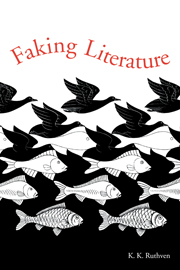Book contents
- Frontmatter
- Contents
- Acknowledgements
- List of abbreviations
- Prologue
- 1 Sampling the spurious
- 2 Framing literary forgery
- 3 Cultivating spuriosity
- 4 Faultlines of authorship
- 5 Fantasies of originality
- 6 Rhetorics of authenticity
- 7 Fake literature as critique
- Epilogue
- Bibliography
- Index of names
- Index of Subjects
5 - Fantasies of originality
Published online by Cambridge University Press: 22 September 2009
- Frontmatter
- Contents
- Acknowledgements
- List of abbreviations
- Prologue
- 1 Sampling the spurious
- 2 Framing literary forgery
- 3 Cultivating spuriosity
- 4 Faultlines of authorship
- 5 Fantasies of originality
- 6 Rhetorics of authenticity
- 7 Fake literature as critique
- Epilogue
- Bibliography
- Index of names
- Index of Subjects
Summary
In what was to become for historians of literary forgery the decade of Macpherson and Chatterton, the category of ‘original genius’ was invented and displayed in the titles of a couple of books published in 1767: William Duff's Essay on Original Genius and Robert Wood's Essay on the Original Genius of Homer. This formula was a conjunction of two key-terms, one foregrounded in the title of William Sharpe's Dissertation upon Genius (1755) and the other in Edward Young's Conjectures on Original Composition (1759). As a contribution to literary genetics, original genius (ingenium) was used as a way of distinguishing Homer, who allegedly exemplified it, from Virgil, who did not, but had made do instead with art (ars). That binary structure could be used homologously to discriminate the polished ars of Pope from the raw ingenium of Shakespeare, which Elizabeth Montagu celebrated in her anti-Voltairean Essay on the Writings and Genius of Shakespeare (1769). For mid-century writers such as Macpherson and Wilkie, therefore, more prestige accrued to the ‘Homeric’ Macphossian than to The Epigoniad, whose studied classicism made it correspondingly Virgilian.
In the proto-Romantic aesthetics which informs Young's Conjectures on Original Composition, ‘original’ is a talismanic word. It remains so. The first publicity brochure for a recent series of facsimiles of medieval manuscript books describes them as ‘quasi-originals’.
- Type
- Chapter
- Information
- Faking Literature , pp. 121 - 145Publisher: Cambridge University PressPrint publication year: 2001
- 1
- Cited by



